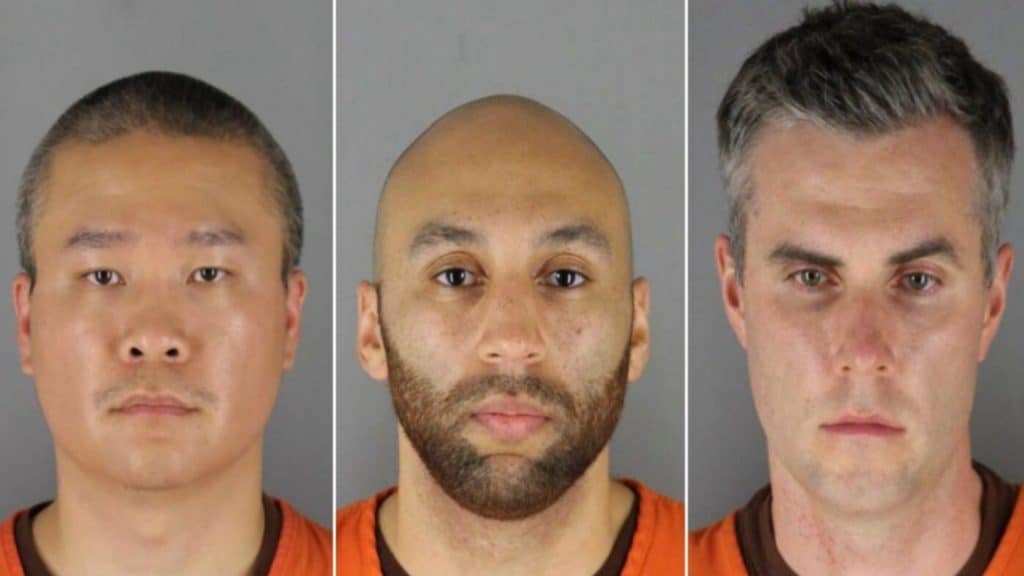Defense: 3 officers at George Floyd killing not trained adequately
J. Alexander Kueng’s attorney, Thomas Plunkett, suggested that the department failed the officers.
An attorney for one of the three former Minneapolis police officers on trial for allegedly violating George Floyd’s civil rights suggested Friday that the department’s training is inadequate when it comes to intervening when a colleague is using excessive force and that new recruits are told to obey their senior officers.
Federal prosecutors say former Officers J. Alexander Kueng, Thomas Lane, and Tou Thao didn’t follow their training when they failed to act to save Floyd’s life on May 25, 2020, as fellow Officer Derek Chauvin kneeled on the Black man’s neck for 9 1/2 minutes while Floyd was handcuffed, facedown and gasping for air. Kueng kneeled on Floyd’s back, Lane held his legs and Thao kept bystanders back.
The three former Minneapolis Police officers remaining to be tried over the death of George Floyd are (from left) Tou Thao, J. Alexander Kueng and Thomas Lane. (Hennepin County Sheriff’s Office)
Inspector Katie Blackwell, the police department’s former head of training, testified Friday that officers are trained that they have a duty to intervene to stop fellow officers from using unreasonable force. They are also trained on the use of neck restraints and that officers must provide follow-up care because the restraints can be dangerous. She said Kueng, Lane, and Thao acted in a way that was “inconsistent” with the department’s policies.
But Kueng’s attorney, Thomas Plunkett, pushed back, suggesting that it was the department that failed the officers.
Plunkett said department policy states that an officer is required to stop or attempt to stop another employee from using inappropriate force, pointing out that Blackwell left “attempt to stop” out of her prior testimony. He also said that when officers are trained in use-of-force scenarios, intervention is not taught.
“There’s no intervention scenario, isn’t that correct?” Plunkett said.
“Not one exactly for intervention,” Blackwell said.
In this image from surveillance video, Minneapolis police Officers from left, Tou Thao, Derek Chauvin, J. Alexander Kueng and Thomas Lane are seen attempting to take George Floyd into custody in Minneapolis, Minn on May 25, 2020. (Court TV via AP, Pool, File)
Plunkett got Blackwell to agree that recruits are taught that they should never argue with an instructor. Lane and Keung were rookies, while Chauvin was the most senior of the four officers at the scene that day.
During his opening statement, Plunkett noted that Chauvin was Kueng’s field training officer, and as such had “considerable sway” over his future. He also said Chauvin called “all of the shots” as the senior officer at the scene. On Friday, Plunkett said department policy would have called for Lane to be in charge at the scene, but Chauvin took over.
Blackwell, who was testifying for a second day, spent hours talking about policy and training. She said Thao took repeated refresher courses on use-of-force policies, including as recently as 2018 and 2019, and that Lane and Kueng had repeated lessons on the same subjects while attending the academy in 2019.
She said officers are taught that they have a duty to use the least amount of force necessary and must stop once the person is no longer resisting, then render any necessary medical aid they’re trained to provide until medical personnel arrive “to make sure that we do everything we can to save a person’s life.”
She also acknowledged that at some point Lane stopped holding Floyd’s legs and that Kueng did not have his knee on Floyd’s back the whole time, but said it is department policy that officers have a duty to intervene to stop another officer from using excessive force.
Blackwell said she saw nothing that would have prevented Thao and Kueng from stopping Chauvin. And although police body camera video shows that Lane was rebuffed when he twice asked if they should roll Floyd onto his side — something Blackwell testified is critical — he still had a duty to intervene.
Plunkett noted that the department’s policy says officers can use their legs and arms to perform neck restraints, but that Blackwell testified that officers aren’t actually trained in using their legs to do them.
(Photo by Megan Varner/Getty Images)
Officers had responded to a 911 call about Floyd, 46, trying to use a counterfeit $20 bill at a corner store. Bystander cellphone video of the killing triggered worldwide protests and a reexamination of racism and policing.
Kueng, who is Black, Lane, who is white, and Thao, who is Hmong American, are charged with willfully depriving Floyd of his constitutional rights while acting under “color of law,” or government authority. One count against all three officers alleges that they saw that Floyd needed medical care and failed to help. A count against Thao and Kueng contends that they didn’t intervene to stop Chauvin. Both counts allege that the officers’ actions resulted in Floyd’s death.
Prosecutors have argued that the “willful” standard can be met by showing “blatantly wrongful conduct” that deprived Floyd of his rights.
Chauvin was convicted of murder and manslaughter in state court last year, and he pleaded guilty in December to a federal civil rights charge. Lane, Kueng, and Thao also face a separate state trial in June on charges alleging that they aided and abetted murder and manslaughter.
Have you subscribed to the Grio podcasts, ‘Dear Culture’ or Acting Up? Download our newest episodes now!
TheGrio is now on Apple TV, Amazon Fire, and Roku. Download theGrio today!
The post Defense: 3 officers at George Floyd killing not trained adequately appeared first on TheGrio.

